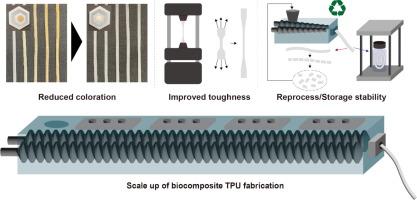一种坚固的可回收的含孢子生物复合热塑性聚氨酯的可伸缩制造
IF 13.3
1区 工程技术
Q1 ENGINEERING, CHEMICAL
引用次数: 0
摘要
热塑性聚氨酯(tpu)是一类多功能热塑性弹性体,但其大多数产品缺乏适当的回收策略或没有报废解决方案。为了追求基于tpu的产品的可持续终结解决方案,最近通过熔融挤压将tpu降解细菌的孢子嵌入tpu中,开发了自分解生物复合tpu。在此,我们改进了带有孢子的生物复合材料,并展示了制造生物复合tpu的工业相关制造条件。为了尽量减少生物复合tpu的着色,对孢子的产生进行了修改。通过减少孢子培养基中的FeSO4,所得到的材料的固有棕色被减弱,产生白色孢子,而不影响孢子的生产力、活力、形态或耐热性。与不含孢子的tpu相比,含有白色孢子的生物复合tpu的韧性增加了45 %,同时在处理后保持 ~ 90 %的孢子活力。此外,生物复合TPU制造被证明使用可扩展的连续挤出机,然后注射成型。与使用实验室规模的微复合剂制备的生物复合TPU相比,通过这些工业相关工艺制备的生物复合TPU具有相当的韧性改善和孢子活力,同时生产力提高了30倍。最后,添加孢子显著提高了生物复合材料tpu的可回收性,在5轮迭代熔融处理后,其韧性保持率达到80% %。此外,在1 年的存储时间内,对生成的tpu的寿命没有观察到负面影响。总的来说,本研究证实了含孢子生物复合tpu具有实际应用前景,提供了一种通过加入孢子基活填料来提高商用tpu韧性和可持续性的可行方法。本文章由计算机程序翻译,如有差异,请以英文原文为准。

Scalable fabrication of a tough and recyclable spore-bearing biocomposite thermoplastic polyurethane
Thermoplastic polyurethanes (TPUs) are a class of versatile thermoplastic elastomers, but most of their products lack a proper recycling strategy or have no end-of-life solutions. To pursue a sustainable end-of-life solution for TPU-based products, self-disintegrating biocomposite TPUs have recently been developed by embedding spores of TPU-degrading bacteria into TPUs via melt extrusion. Herein, we improve upon spore-bearing biocomposites and demonstrate industrially relevant manufacturing conditions for fabricating biocomposite TPUs. To minimize the coloration of biocomposite TPUs, spore production was modified. The innate brown color of the resulting materials was diminished by reducing FeSO4 in sporulation media, generating white spores without compromising spore productivity, viability, morphology or heat-shock tolerance. Biocomposite TPUs containing white spores displayed a 45 % increase in toughness compared to TPUs without spores, while retaining ∼ 90 % spore viability post processing. Furthermore, biocomposite TPU fabrication was demonstrated using a scalable continuous extruder followed by injection molding. Biocomposite TPUs generated by these industry-relevant processes exhibited comparable toughness improvement and spore viability to biocomposite TPU prepared using a lab scale microcompounder, while enhancing productivity by 30-fold. Finally, spore addition significantly improved the recyclability of biocomposite TPUs, enabling 80 % toughness retention after 5 rounds of iterative melt processing. Additionally, no negative effect on the lifespan of the generated TPUs was observed over 1 year of storage. Overall, this study confirms that spore-bearing biocomposite TPUs are promising for practical applications, offering an accessible method to enhance toughness and sustainability of commercial TPUs through the incorporation of spore-based living fillers.
求助全文
通过发布文献求助,成功后即可免费获取论文全文。
去求助
来源期刊

Chemical Engineering Journal
工程技术-工程:化工
CiteScore
21.70
自引率
9.30%
发文量
6781
审稿时长
2.4 months
期刊介绍:
The Chemical Engineering Journal is an international research journal that invites contributions of original and novel fundamental research. It aims to provide an international platform for presenting original fundamental research, interpretative reviews, and discussions on new developments in chemical engineering. The journal welcomes papers that describe novel theory and its practical application, as well as those that demonstrate the transfer of techniques from other disciplines. It also welcomes reports on carefully conducted experimental work that is soundly interpreted. The main focus of the journal is on original and rigorous research results that have broad significance. The Catalysis section within the Chemical Engineering Journal focuses specifically on Experimental and Theoretical studies in the fields of heterogeneous catalysis, molecular catalysis, and biocatalysis. These studies have industrial impact on various sectors such as chemicals, energy, materials, foods, healthcare, and environmental protection.
 求助内容:
求助内容: 应助结果提醒方式:
应助结果提醒方式:


